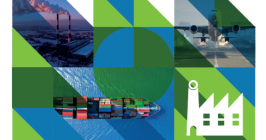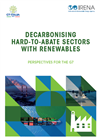

-
-
IRENA (2024), Decarbonising hard-to-abate sectors with renewables: Perspectives for the G7, International Renewable Energy Agency, Abu Dhabi.
Copied
https://www.irena.org/-/media/Files/IRENA/Agency/Publication/2024/Apr/IRENA_G7_Decarbonising_hard_to_abate_sectors_2024.pdf
Copied
Decarbonising hard-to-abate sectors with renewables: Perspectives for the G7
Newsletter
The Paris Agreement goal to limit global surface temperature to 1.5°C above pre-industrial levels by the end of this century requires the swift decarbonisation of all sectors of the economy by 2050. However, some industrial and transport sub-sectors are significant greenhouse gas emitters and are harder to decarbonise due to their physical, technological or market-specific circumstances. Sectors that are particularly hard-to-abate include heavy-duty trucking, shipping, aviation, iron and steel, and chemicals and petrochemicals.
These sectors alone account for approximately one-quarter of the world's energy consumption and around one-fifth of total CO2 emissions. Whilst their full decarbonisation will require a combination of approaches, effective emission reduction pathways for these sectors rely primarily on renewable energy and energy efficiency.
This report, prepared by IRENA at the request of the 2024 Italian G7 Presidency, demonstrates the pivotal role the G7 can play in accelerating the global energy transition in hard-to-abate sectors. The report explores in detail the decarbonisation status, pathways and progress of five hard-to-abate sectors; highlights cross-cutting issues, challenges and solutions; and provides concrete recommendations on how the G7 can establish the enabling conditions required to implement these solutions.




